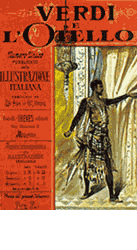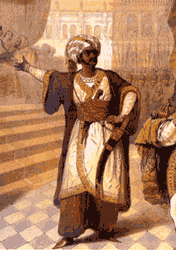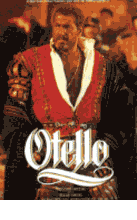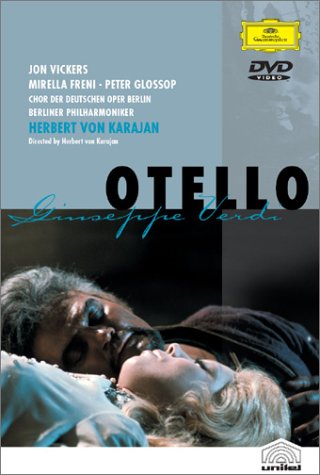|
The 'chocolate plan', as Verdi was fond of calling the Otello project, germinated in 1879, when Giulio Ricordi proposed Arrigo Boito for the revision of Simon Boccanegra, probably as a trial-run for further fruitful collaboration. This was quite audacious as the two men were on rather cool terms at the time.
They had worked together in 1862 when the 20-year-old Boito had supplied the text of the Inno delle Nazioni for the World Exhibition in London, for which Verdi, in gratitude, presented his young colleague with a gold watch.
But a much-publicised incident in 1863 strained their hitherto friendly, if distant, relationship. Boito was part of a loose affiliation of young artists known as the 'scapigliatura' - a progressive and somewhat wild group out to change the face of Italian art - or Italian music to be more precise. Boito had written an ode on the occasion of the premiere of Franco Faccio's opera 'I profughi fiamminghi', containing the line, meant as an encouragement to Faccio: 'Perhaps the one has already been born who will revive true and pure art on its altar, which is soiled like the wall of a brothel'.
Understandably, Verdi wondered whether these sentiments included him and the 24 operas he had composed up to that point. In the following years it became clear that Boito had not directed his rash remark at Verdi, but the blemish on their relations was not entirely eradicated.
Boito wrote brilliant and clever poetry, but his efforts at setting his words to music did not meet with much success - his original 'Mefistofele' was a fiasco in 1868, although the revision fared better in 1875. However, he was a sought-after librettist (i.a. he wrote the libretto of Ponchielli's 'La Gioconda' under the pen name of Tobia Gorrio), and it was in that capacity that Ricordi had plans for him - Verdi willing.
At first Verdi was reluctant to commit himself; he was 66 and wanted nothing better than just potter about on his estate at Sant'Agata. But the seed was sown, watered tenderly by Ricordi and Giuseppina, and in the following months he became increasingly involved and finally hooked, although he always professed to care little if the opera ever saw the stage.
Verdi knew he would have to go on a different track with this work, away from the closed musical structure of recitative, aria, cabaletta: something that he had attempted all his long professional life. So far, the constraints of the 'business' - and the expectations of the opera-going public - had prevented him from taking his ideas to their logical conclusion. But now he felt he had nothing to lose, and over the next six years he and Boito corresponded endlessly about their project.
There were many misunderstandings and disagreements - in fact the old rift very nearly opened up again in 1884 when Verdi read of an incident that had taken place in Naples, where Boito had attended performances of his 'Mefistofele'. At the subsequent dinner in his honour, Boito mentioned the Otello project and remarked that, although he had embarked on it reluctantly, he would now be only too glad were he able to compose it himself. This was reported in the newspapers, implying, of course, that Boito regretted having sold the libretto to Verdi. But Boito had meant no such thing, and didn't even mention the occurrence to Verdi when next he stayed at Sant'Agata, not realising that Verdi had already heard about it and was waiting for an explanation.
In a huff as none was forthcoming, Verdi offered to return the libretto and gentle persuasion was called for in order to get their relationship back on track. As a final act of 'penitence' Boito sent Verdi a new version - the definitive version - of Iago's Credo.
There were more delays while they were hammering out the libretto, the characters, the staging, all imaginable small details (reflected in the fascinating disposizione scenica - essential reading for performers and producers!), but growing mutual respect and the common purpose to produce something novel, daring, stirring - and not forgetting Verdi's wife Giuseppina with the aid of Ricordi - brought them back together time and again. Their professional collaboration turned into a deep friendship, and after the 'chocolate plan' reached La Scala in 1887 they went on to create Falstaff, so wise and full of mirth - Verdi's last stage work, which premiered in 1893 when he was in his 80th year.
Verdi and Boito supervised the January 1887 rehearsals closely - so closely, in fact, that Verdi himself took some of the stage direction in hand, demonstrating to Tamagno, the Otello, exactly how to stab himself and die by miming the scene, and he showed the Desdemona, Romilda Pantaleoni, what he meant by a 'fervent, passionate embrace' in the Love Duet.
The premiere of Otello at La Scala on 5th February 1887 created unparalleled excitement among music lovers. Verdi's pen had been idle since the Requiem thirteen years before. His last opera, Aida, had premiered in 1871, Wagner had meanwhile become familiar to Italian audiences - what kind of music would be heard from the aged Bussetan maestro?
Blanche Roosevelt, an American singer and writer visiting Italy at the time, set the scene in her letter from 'Otellopolis' dated 5th February 1887, vividly describing the mounting tension in the city of Milan, with everyone out and about from 5 o'clock (in the morning!) onwards, the piazza in front of La Scala black with people; how every last seat in the theatre was filled a whole hour before the curtain went up; how, after the triumphant performance, Verdi was presented with a silver-bound book containing the good wishes and signatures of every single citizen of Milan; how his coach-and-horses became coach-and-people as it was drawn back to his hotel by adoring fans; how the singing and cries of 'Viva Verdi!' went on into the small hours of the morning.
The unparalleled excitement had turned into an unparalleled success, and the publishing house of Ricordi was beleaguered by impresarios wishing to produce the work in their own houses. La Scala showed Otello a further 24 times in its first year, and Rome, Venice, Brescia and Parma followed within months of the premiere. Abroad the first productions of 1887 were seen in Mexico City, St. Petersburg and Budapest, with Hamburg, Munich, Cologne, Vienna, Amsterdam, New York, Buenos Aires and Constantinople following in 1888. And so it went on.
The Opéra in Paris, however, dragged its feet over Otello, but in 1894 the time seemed ripe, suitable singers were available, and a French translation had been fashioned by Du Locle and Boito, to which Pierre Gailhard, the director of the Opéra, contributed his own version of the Willow Song - much to Verdi's annoyance. Diplomatically, Boito convinced him to go along with it.
There remained the matter of the odious ballet, which was still obligatory at the Opéra. Verdi and Boito grudgingly decided to incorporate it into Act III, following the ambassadors' arrival, where it would do the least damage to the unfolding stage drama.
From the outset, Verdi had felt that the monumental Act III concertato (cf. disposizione scenica) lacked clarity and comprehensibility: Iago's two vital conversations - first with Otello, then with Roderigo - did not focus the attention sufficiently. For Paris, he took the opportunity to radically shorten and almost totally re-compose this scene (beginning with Desdemona's A terra... sě... nel livido fango and ending with Otello's Fuggite!), and using a lighter orchestration to put even more emphasis on Iago's scheming.
The 'Paris concertato' is used occasionally as a viable alternative (e.g. Abbado in Salzburg 1996), but it has not found its way into the definitive printed score. It is the last piece of vocal drama that Verdi ever wrote for the stage.
Synopis
Cyprus, late fifteenth century.
 The Moor Otello, governor of the island and a general in the Venetian army, arrives in port as a tempest rages. Iago, Otello's ensign, confers with Roderigo, a fop who has come to Cyprus because of his unrequited love for Desdemona, a Venetian beauty recently married to Otello. Promising to help Roderigo, Iago says Desdemona should soon tire of her Moorish husband, adding that he himself has reasons for revenge on Otello, who passed him over for advancement, promoting Cassio instead. Iago proposes a toast; when Cassio declines any more drink, Iago says he cannot refuse to salute Otello's new wife. Cassio consents and grows tipsy as Iago provokes Roderigo to a duel with Cassio. When Montano, Otello's predecessor in command, tries to separate the two, Cassio attacks him as well. Otello comes out of the castle to restore order. When he sees Desdemona disturbed by the fray, he takes away Cassio's recent promotion. Sending everyone home, Otello turns to his bride, and they recall their courtship. Leading her back into the castle, Otello kisses her.
The Moor Otello, governor of the island and a general in the Venetian army, arrives in port as a tempest rages. Iago, Otello's ensign, confers with Roderigo, a fop who has come to Cyprus because of his unrequited love for Desdemona, a Venetian beauty recently married to Otello. Promising to help Roderigo, Iago says Desdemona should soon tire of her Moorish husband, adding that he himself has reasons for revenge on Otello, who passed him over for advancement, promoting Cassio instead. Iago proposes a toast; when Cassio declines any more drink, Iago says he cannot refuse to salute Otello's new wife. Cassio consents and grows tipsy as Iago provokes Roderigo to a duel with Cassio. When Montano, Otello's predecessor in command, tries to separate the two, Cassio attacks him as well. Otello comes out of the castle to restore order. When he sees Desdemona disturbed by the fray, he takes away Cassio's recent promotion. Sending everyone home, Otello turns to his bride, and they recall their courtship. Leading her back into the castle, Otello kisses her.
A room in the castle, opening on a garden.
 Iago tells Cassio that by presenting his case to Desdemona he can be reinstated, because Otello is influenced by his wife. As soon as Cassio is out of sight, Iago declares his belief that a cruel God created man wicked, and life has no meaning. Iago watches as Cassio approaches Desdemona in the garden, and when Otello comes in, the lieutenant makes casual remarks about Desdemona's fidelity. Softened by his wife's beauty, Otello greets her, but she brings up the question of Cassio's demotion, annoying him. When she offers a handkerchief to wipe his brow, he throws it to the ground, where her attendant, Emilia, retrieves it. As Desdemona tries to calm Otello, Iago orders Emilia (his wife) to give him the handkerchief. Otello asks to be alone, and the others leave, except for Iago, who hangs back to observe Otello's growing suspicion. To fan the flames, Iago invents a story about how Cassio spoke lovingly of Desdemona in his sleep. Then he mentions her handkerchief, saying he saw it in Cassio's hand. Beside himself, Otello swears to have vengeance, and Iago joins in the oath.
Iago tells Cassio that by presenting his case to Desdemona he can be reinstated, because Otello is influenced by his wife. As soon as Cassio is out of sight, Iago declares his belief that a cruel God created man wicked, and life has no meaning. Iago watches as Cassio approaches Desdemona in the garden, and when Otello comes in, the lieutenant makes casual remarks about Desdemona's fidelity. Softened by his wife's beauty, Otello greets her, but she brings up the question of Cassio's demotion, annoying him. When she offers a handkerchief to wipe his brow, he throws it to the ground, where her attendant, Emilia, retrieves it. As Desdemona tries to calm Otello, Iago orders Emilia (his wife) to give him the handkerchief. Otello asks to be alone, and the others leave, except for Iago, who hangs back to observe Otello's growing suspicion. To fan the flames, Iago invents a story about how Cassio spoke lovingly of Desdemona in his sleep. Then he mentions her handkerchief, saying he saw it in Cassio's hand. Beside himself, Otello swears to have vengeance, and Iago joins in the oath.
In the armory.
 Iago tells Otello that more proof is forthcoming of his betrayal by his wife and Cassio. Desdemona enters, and Otello speaks calmly until she revives the subject of Cassio. When Otello demands the handkerchief he gave her, she again pleads for Cassio. Otello calls the shocked woman a courtesan and dismisses her. He cries out that heaven could have afflicted him with anything but this, then hides as Iago returns with Cassio. Iago flashes the handkerchief he stole and leads Cassio on in banter in such a way that Otello overhears only fragments and thinks they are talking about Desdemona. As trumpets announce dignitaries from Venice, Otello vows to kill his wife that very night. The Moor greets Lodovico, who recalls him to Venice and appoints Cassio to govern Cyprus. Losing control at this news, Otello pushes his wife to the floor with insults. He orders everyone out and collapses in a seizure as Iago gloats over him, crying, "Behold the Lion!"
Iago tells Otello that more proof is forthcoming of his betrayal by his wife and Cassio. Desdemona enters, and Otello speaks calmly until she revives the subject of Cassio. When Otello demands the handkerchief he gave her, she again pleads for Cassio. Otello calls the shocked woman a courtesan and dismisses her. He cries out that heaven could have afflicted him with anything but this, then hides as Iago returns with Cassio. Iago flashes the handkerchief he stole and leads Cassio on in banter in such a way that Otello overhears only fragments and thinks they are talking about Desdemona. As trumpets announce dignitaries from Venice, Otello vows to kill his wife that very night. The Moor greets Lodovico, who recalls him to Venice and appoints Cassio to govern Cyprus. Losing control at this news, Otello pushes his wife to the floor with insults. He orders everyone out and collapses in a seizure as Iago gloats over him, crying, "Behold the Lion!"
|




 VIEW OTELLO HIGHLIGHTS
VIEW OTELLO HIGHLIGHTS

 The Moor Otello, governor of the island and a general in the Venetian army, arrives in port as a tempest rages. Iago, Otello's ensign, confers with Roderigo, a fop who has come to Cyprus because of his unrequited love for Desdemona, a Venetian beauty recently married to Otello. Promising to help Roderigo, Iago says Desdemona should soon tire of her Moorish husband, adding that he himself has reasons for revenge on Otello, who passed him over for advancement, promoting Cassio instead. Iago proposes a toast; when Cassio declines any more drink, Iago says he cannot refuse to salute Otello's new wife. Cassio consents and grows tipsy as Iago provokes Roderigo to a duel with Cassio. When Montano, Otello's predecessor in command, tries to separate the two, Cassio attacks him as well. Otello comes out of the castle to restore order. When he sees Desdemona disturbed by the fray, he takes away Cassio's recent promotion. Sending everyone home, Otello turns to his bride, and they recall their courtship. Leading her back into the castle, Otello kisses her.
The Moor Otello, governor of the island and a general in the Venetian army, arrives in port as a tempest rages. Iago, Otello's ensign, confers with Roderigo, a fop who has come to Cyprus because of his unrequited love for Desdemona, a Venetian beauty recently married to Otello. Promising to help Roderigo, Iago says Desdemona should soon tire of her Moorish husband, adding that he himself has reasons for revenge on Otello, who passed him over for advancement, promoting Cassio instead. Iago proposes a toast; when Cassio declines any more drink, Iago says he cannot refuse to salute Otello's new wife. Cassio consents and grows tipsy as Iago provokes Roderigo to a duel with Cassio. When Montano, Otello's predecessor in command, tries to separate the two, Cassio attacks him as well. Otello comes out of the castle to restore order. When he sees Desdemona disturbed by the fray, he takes away Cassio's recent promotion. Sending everyone home, Otello turns to his bride, and they recall their courtship. Leading her back into the castle, Otello kisses her.
 Iago tells Cassio that by presenting his case to Desdemona he can be reinstated, because Otello is influenced by his wife. As soon as Cassio is out of sight, Iago declares his belief that a cruel God created man wicked, and life has no meaning. Iago watches as Cassio approaches Desdemona in the garden, and when Otello comes in, the lieutenant makes casual remarks about Desdemona's fidelity. Softened by his wife's beauty, Otello greets her, but she brings up the question of Cassio's demotion, annoying him. When she offers a handkerchief to wipe his brow, he throws it to the ground, where her attendant, Emilia, retrieves it. As Desdemona tries to calm Otello, Iago orders Emilia (his wife) to give him the handkerchief. Otello asks to be alone, and the others leave, except for Iago, who hangs back to observe Otello's growing suspicion. To fan the flames, Iago invents a story about how Cassio spoke lovingly of Desdemona in his sleep. Then he mentions her handkerchief, saying he saw it in Cassio's hand. Beside himself, Otello swears to have vengeance, and Iago joins in the oath.
Iago tells Cassio that by presenting his case to Desdemona he can be reinstated, because Otello is influenced by his wife. As soon as Cassio is out of sight, Iago declares his belief that a cruel God created man wicked, and life has no meaning. Iago watches as Cassio approaches Desdemona in the garden, and when Otello comes in, the lieutenant makes casual remarks about Desdemona's fidelity. Softened by his wife's beauty, Otello greets her, but she brings up the question of Cassio's demotion, annoying him. When she offers a handkerchief to wipe his brow, he throws it to the ground, where her attendant, Emilia, retrieves it. As Desdemona tries to calm Otello, Iago orders Emilia (his wife) to give him the handkerchief. Otello asks to be alone, and the others leave, except for Iago, who hangs back to observe Otello's growing suspicion. To fan the flames, Iago invents a story about how Cassio spoke lovingly of Desdemona in his sleep. Then he mentions her handkerchief, saying he saw it in Cassio's hand. Beside himself, Otello swears to have vengeance, and Iago joins in the oath.
 Iago tells Otello that more proof is forthcoming of his betrayal by his wife and Cassio. Desdemona enters, and Otello speaks calmly until she revives the subject of Cassio. When Otello demands the handkerchief he gave her, she again pleads for Cassio. Otello calls the shocked woman a courtesan and dismisses her. He cries out that heaven could have afflicted him with anything but this, then hides as Iago returns with Cassio. Iago flashes the handkerchief he stole and leads Cassio on in banter in such a way that Otello overhears only fragments and thinks they are talking about Desdemona. As trumpets announce dignitaries from Venice, Otello vows to kill his wife that very night. The Moor greets Lodovico, who recalls him to Venice and appoints Cassio to govern Cyprus. Losing control at this news, Otello pushes his wife to the floor with insults. He orders everyone out and collapses in a seizure as Iago gloats over him, crying, "Behold the Lion!"
Iago tells Otello that more proof is forthcoming of his betrayal by his wife and Cassio. Desdemona enters, and Otello speaks calmly until she revives the subject of Cassio. When Otello demands the handkerchief he gave her, she again pleads for Cassio. Otello calls the shocked woman a courtesan and dismisses her. He cries out that heaven could have afflicted him with anything but this, then hides as Iago returns with Cassio. Iago flashes the handkerchief he stole and leads Cassio on in banter in such a way that Otello overhears only fragments and thinks they are talking about Desdemona. As trumpets announce dignitaries from Venice, Otello vows to kill his wife that very night. The Moor greets Lodovico, who recalls him to Venice and appoints Cassio to govern Cyprus. Losing control at this news, Otello pushes his wife to the floor with insults. He orders everyone out and collapses in a seizure as Iago gloats over him, crying, "Behold the Lion!"